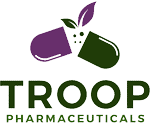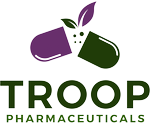TROOP-C contains Vitamin C, which is a water-soluble vitamin needed for normal growth and development.
Water-soluble vitamins dissolve in water. Leftover amounts of the vitamin leave the body through the urine. Although the body keeps a small reserve of these vitamins, they have to be taken regularly to prevent a shortage in the body.
Functions of TROOP-C (Vitamin C)
TROOP-C (Vitamin C) is needed for the growth and repair of tissues in all parts of your body. It is used to:
– Form an important protein used to make skin, tendons, ligaments, and blood vessels
– Heal wounds and form scar tissue
– Repair and maintain cartilage, bones, and teeth
– Aid in the absorption of iron
– Reduce ageing of skin and wrinkles.
– Prevent and treat Ultraviolet damage.
Vitamin C is one of many antioxidants. Antioxidants are nutrients that block some of the damage caused by free radicals.
Free radicals are made when your body breaks down food or when you are exposed to tobacco smoke or radiation. The buildup of free radicals over time is largely responsible for the aging process. Free radicals may play a role in cancer, heart disease, and conditions like arthritis.
The body is not able to make vitamin C on its own. It does not store vitamin C. It is therefore important to include plenty of vitamin C-containing foods in your daily diet.
For many years, vitamin C has been a popular household remedy for the common cold. Research shows that for most people, vitamin C supplements or vitamin C-rich foods do not reduce the risk of getting the common cold.
However, people who take vitamin C supplements regularly might have slightly shorter colds or somewhat milder symptoms.
Food Sources of Vitamin C
All fruits and vegetables contain some amount of Vitamin C.
Fruits with the highest sources of Vitamin C include:
– Cantaloupe
– Citrus fruits and juices, such as orange and grapefruit
– Kiwi fruit
– Mango
– Papaya
– Pineapple
– Strawberries, raspberries, blueberries, and cranberries
– Watermelon
Vegetables with the highest sources of vitamin C include:
– Broccoli, Brussels sprouts, and cauliflower
– Green and red peppers
– Spinach, cabbage, turnip greens, and other leafy greens
– Sweet and white potatoes
– Tomatoes and tomato juice
Some cereals and other foods and beverages are fortified with vitamin C. Fortified means a vitamin or mineral has been added to the food. Check the product labels to see how much vitamin C is in the product.
Cooking vitamin C-rich foods or storing them for a long period of time can reduce the vitamin C content. Microwaving and steaming vitamin C-rich foods may reduce cooking losses. The best food sources of vitamin C are uncooked or raw fruits and vegetables. Exposure to light can also reduce vitamin C content. Choose orange juice that is sold in a carton instead of a clear bottle.
Side Effects
Serious side effects from too much TROOP-C (Vitamin C) are very rare, because the body cannot store the vitamin. However, amounts greater than 2,000 mg/day are not recommended. Doses this high can lead to stomach upset and diarrhea. Large doses of vitamin C supplementation are not recommended during pregnancy. They can lead to shortage of vitamin C in the baby after delivery.
Too little TROOP-C (Vitamin C) can lead to signs and symptoms of deficiency, including:
– Anemia
– Bleeding gums
– Decreased ability to fight infection
– Decreased wound-healing rate
– Dry and splitting hair
– Easy bruising
– Gingivitis (inflammation of the gums)
– Nosebleeds
– Possible weight gain because of slowed metabolism
– Rough, dry, scaly skin
– Swollen and painful joints
– Weakened tooth enamel
A severe form of vitamin C deficiency is known as scurvy. This mainly affects older, malnourished adults.
Smokers or those who are around secondhand smoke at any age should increase their daily amount of TROOP-C (Vitamin C).
Women who are pregnant or breastfeeding and those who smoke need higher amounts of TROOP-C (Vitamin C).




